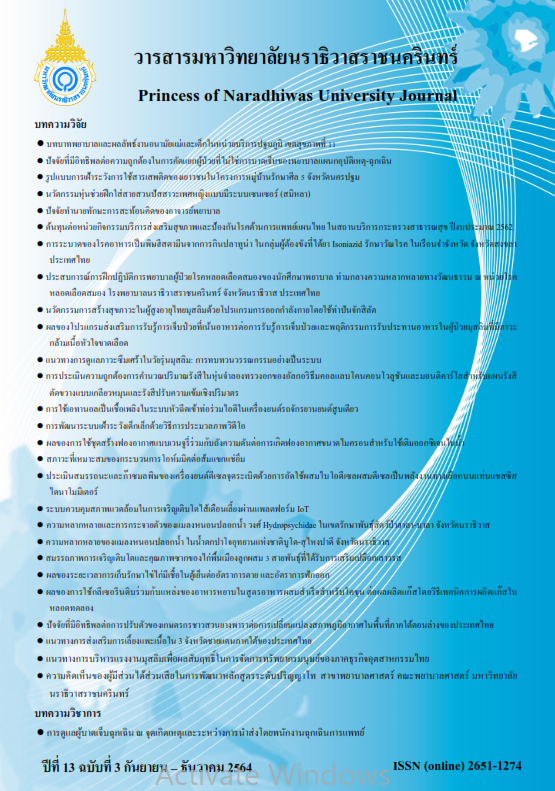Stakeholders’ Opinions on the Development of a Master Program in Nursing Science, Faculty of Nursing, Princess of Naradhiwas University
Keywords:
A master’s degree program in Nursing science, Faculty of Nursing Princess of Naradhiwas University, StakeholdersAbstract
This study aimed (1) to study the current situation, trend and educational requirements, (2) to analyze the feasibility of organizing and (3) to present the educational management of a master program in nursing science at the faculty of nursing, Princess of Naradhiwas University. 174 registered nurses and 91 of fourth year nursing students were selected by purposive sampling. The questionnaires were used as a research instrument which its index of item objective congruence was 1.0. The semi-structure interviews were conducted to collect data from 30 stakeholders including users of graduates and alumni of the faculty of nursing. Descriptive statistics including frequency, percentage, mean, and standard deviation, and content analysis were used for data analysis.
According to the survey, the results showed that 53 registered nurses (42.74 percent) and 59 fourth-year nursing students (67.05 percent) have further requirements for pursuing a master’s degree in nursing science. The interested departments were mostly in adult and elderly nursing (35.8 percent) and elderly nursing (17.0 percent), and 60.4 percent of target participants prefer to register for weekend class. It was also found that 36 fourth-year nursing students (61.0 percent) can study while they do full-time job on weekdays. From the content analysis, it showed that the guidelines for the educational management was to develop graduates to be knowledgeable and able to see the cause of problems and be able to solve them, to build leadership in nursing, to develop graduates to obtain skills especially in research and innovation including understanding the context of a multicultural society in the three southern border provinces
The master’s degree in nursing science is significant and is needed in this region. Suggestions for teaching and learning models should be cooperated between educational institutions to ensure efficient operation and academic excellence.
References
Chalakbang, W. (2017). Mixed methods research. Nakhon Phanom University Journal, 7(2), 124-132.
Charuwanno, R., Wisanskoonwong, P., Wongchanglor, J., Wongareesawat, C., Tipsancam, N., Wongrostrai, Y., …. Trakolngamden, B. (2018). The need for further education in nursing among registered nurses in Bangkok metropolitan. Kuakarun Journal of Nursing, 25(1), 7-24.
Faculty of Nursing, Princess of Naradhiwas university. (2016). TQF 2 Nursing Science Program, Revised 2016. (in Thai).
Faculty of Nursing, Princess of Naradhiwas University. (2019). Report of Asean University Network Quality Assurance. (in Thai).
Jensantikul, N. (2013). Three southern border provinces institutionalization and action under structural functionalism theory. Suddhiparitad Journal, 27(84), 77-90.
Junadung, T., & Aungsuroch, Y. (2009). A study of effective leadership components of head nurses, government university hospitals. Thai Journal of Nursing Council, 24(4), 43-55.
Kaewsasri, A., Nilliaum, R., & Heetaksorn, C. (2017). Changes in Thai society and culture and trends of nursing profession. Songklanagarind Journal of Nursing, 37(3), 160-169.
Mingsriritum, K. (2009). Self-directed learning on web-based learning. Journal of Education Khon Kaen University, 32(1), 6-13.
Ministry of Education. (2017). Notification for the Thai qualification standard for a graduate’s degree in nursing science. Retrieved September 15, 2020 from http://www.mua.go.th/users/tqf- hed/news
Nursing Council. (2009). Handbook of preparation of specialized nursing courses. Retrieved September 15, 2020 from http://www.tnc.or.th/files/2010/12/page-430/_16037.pdf
Nursing Division. (2018). National nursing service strategy 2017-2021. Retrieved September 15, 2020 from http://www. don.go.th/book_nursing/strategic_20.pdf.
Office of the Education Council. (2018). Average academic year in Thailand 2017. Bangkok; Prigwan graphic. (in Thai).
Princess of Naradhiwas University. (2019). University Strategic Plan 2019-2021. Retrieved September 10, 2020 from www.pnu.ac.th
Tadsri, J. (2015). Opinions of stakeholders on the revised curriculum in master of nursing program, faculty of nursing, Prince of Songkla University. Princess of Naradhiwas University Journal, 7(3), 74-84.
Tangcharoensathein, V., Witthayapipopsakul, W., Panichkriangkrai, W., Patcharanarumol, W., & Mills, A. (2008). Health system development in Thailand: A solid platform for successful implementation of universal health coverage. The Lancet. Retrieved March 20, 2020 from https://www.thelancet.com/pb-assets/Lancet/pdfs/S0140673618301983_Thai.pdf
Thanormchayathawat, B., Vanitsuppavong, P., Niemted, W., & Portjanatanti, N. (2016). 21st Century skills: A challenge for student development. The Southern College Network Journal of Nursing and Public Health, 3(2), 208-222.
Wonganantnont, P. (2014). Nursing informatics. Journal of the Royal Thai Army Nurses, 15(3), 81-85.




